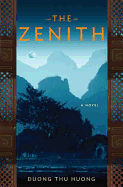
Duong Thu Huong's The Zenith has a Matryoshka doll construction that shows the linkage between trust and betrayal, blindness and visibility. In the novel's central narrative, the Vietnamese ruler Ho Chi Minh is a Lear-like figure whose delusion of sainthood turns him into a figurehead and destroys those closest to him. This contrasts to the stories of a charismatic woodcutter whose instinctual awareness of traditional mores allows him to break taboos, and the unraveling of a marriage long considered a perfect union between two individuals within Ho's personal circle.
Huong's meticulous fictional portrait of Ho Chi Minh shows how his blind trust in the infallibility of shared power strips him of all authority, exiling him to the "zenith" of an isolate mountain in North Vietnam. His impotence parallels the plight of Tran Vu, who does not see until too late that his beautiful wife--like his revolutionary ideal--is morally bankrupt. On the other hand, the woodcutter's steadfastness embodies Huong's core message: Communism's death knell lies in its rejection of both traditional values and individual rights, such as religion, filial piety, sexual freedom and personal honesty. Throughout The Zenith, Huong shows that no political system can remain viable if it is divorced from these main elements of the human experience. --Thuy Dinh, editor, Da Mau magazine

